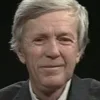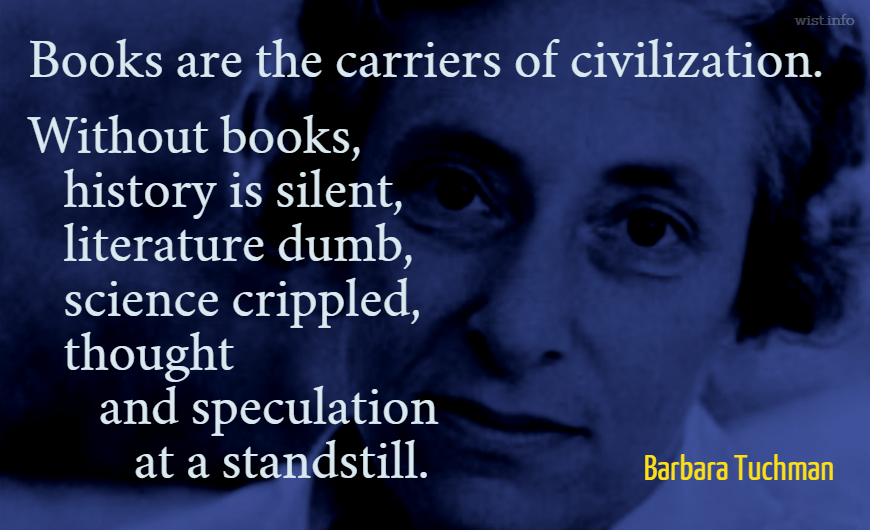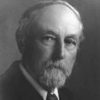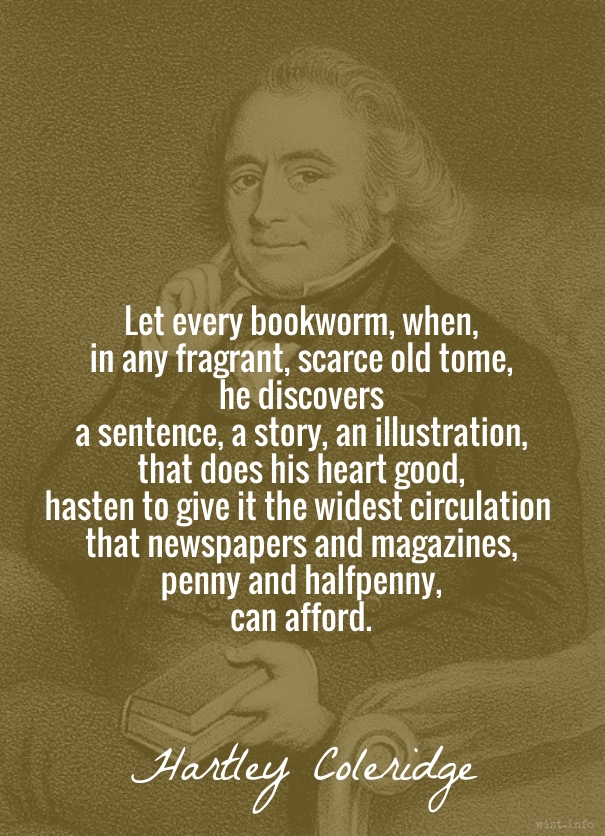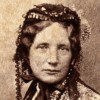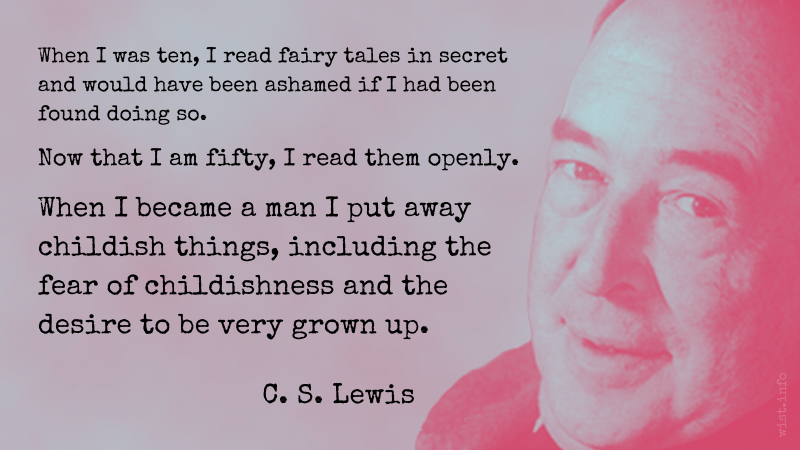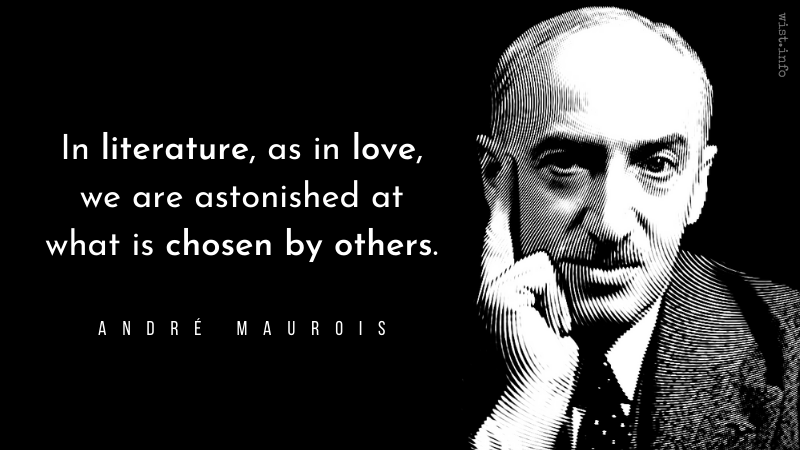Indeed, it is a cruel truth of the history of all art and literature that most would-be poets, writers, and painters fail. The man or woman of real talent is rare, the born genius rarer still. For every book that survives the merciless judgment of time, there are nine hundred and ninety-nine rotting unread in libraries and nine thousand and ninety-nine that were never written in the first place.
Michael Harrington (1928-1989) American writer, political activist, political scientist [Edward Michael Harrington, Jr.]
Fragments of the Century, ch. 2 “The Death of Bohemia” (1973)
(Source)
Quotations about:
literature
Note not all quotations have been tagged, so Search may find additional quotes on this topic.
There is of course a clash between ‘literary’ technique, and the fascination of elaborating in detail an imaginary mythical Age (mythical, not allegorical: my mind does not work allegorically). As a story, I think it is good that there should be a lot of things unexplained (especially if an explanation actually exists); and I have perhaps from this point of view erred in trying to explain too much, and give too much past history. Many readers have, for instance, rather stuck at the Council of Elrond. And even in a mythical Age there must be some enigmas, as there always are. Tom Bombadil is one (intentionally).
J.R.R. Tolkien (1892-1973) English writer, fabulist, philologist, academic [John Ronald Reuel Tolkien]
Letter to Naomi Mitchison (1954-04-25)
(Source)
Letter 144 in Humphrey Carpenter, ed., The Letters of J.R.R. Tolkien (1981).
I am beginning to feel a little more like an author now that I have had a book banned. The literary life, in this country, begins in jail.
E. B. White (1899-1985) American author, critic, humorist [Elwyn Brooks White]
Letter to Stanley Hart White (1944-06)
(Source)
On reading that the US Army and Navy had refused to publish an "Armed Services Edition" of his Harper's magazine essay collection, One Man's Meat (1942), for "political implications." The decision was later rescinded.
Nothing reveals more clearly men’s attitude to learning and literature, and what use they think these are to the State, than the low price they put on them, and their opinion of those who have chosen to practice them.
[Rien ne découvre mieux dans quelle disposition sont les hommes à l’égard des sciences et des belles-lettres, et de quelle utilité ils les croient dans la république, que le prix qu’ils y ont mis, et l’idée qu’ils se forment de ceux qui ont pris le parti de les cultiver.]
Jean de La Bruyère (1645-1696) French essayist, moralist
The Characters [Les Caractères], ch. 12 “Of Opinions [Des Jugements],” § 17 (12.17) (1688) [tr. Stewart (1970)]
(Source)
(Source (French)). Alternate translations:
Nothing discovers better what disposition men have to Knowledge and Learning, and how profitable they are esteem'd to the Publick, than the price which is set on them, and the Idea they have formed of those who have taken the pains to improve them.
[Bullord ed. (1696)]
Nothing discovers better what regard Men have to Science and polite Learning, and how profitable they esteem them to the Publick, than the price they set on them, and the Idea they form to themselves of those who have taken the pains to cultivate them.
[Curll ed. (1713)]
Nothing better manifests the Regard paid to the Sciences and Literature, and Men's Sense of their Utility to the Public, than the Recompences assigned to them, and the Repute in which they stand who excel in them.
[Browne ed. (1752)]
Nothing better demonstrates how men regard science and literature, and of what use they are considered in the State, than the recompense assigned to them, and the idea generally entertained of those persons who resolve to cultivate them.
[tr. Van Laun (1885)]
Imaginary evil is romantic and varied; real evil is gloomy, monotonous, barren, boring. Imaginary good is boring; real good is always new, marvelous, intoxicating.
Simone Weil (1909-1943) French philosopher
Gravity and Grace [La Pesanteur et la Grâce], “Evil” (1947) [ed. Thibon] [tr. Crawford/von der Ruhr (1952)]
(Source)
Speaking of the portrayal of good and evil in literature.
Books aren’t just commodities; the profit motive is often in conflict with the aims of art. We live in capitalism, its power seems inescapable — but then, so did the divine right of kings. Any human power can be resisted and changed by human beings. Resistance and change often begin in art. Very often in our art, the art of words.
Ursula K. Le Guin (1929-2018) American writer
Speech, accepting the National Book Foundation Medal (19 Nov 2014)
(Source)
On receiving the National Book Foundation Medal for Distinguished Contribution to American Letters at the 65th National Book Awards. Video of the speech.
The idea of compassion has become unfashionable. It’s gotten confused with sentimentality, though you English majors know the difference: sentimentality is emotion without responsibility; compassion is the recognition of shared humanity. Chalk and cheese. Sentimentality is superficial, easy listening that does nothing to expand our understanding. Compassion is quite different. Risky and exigent, it puts you inside someone else. This is one of literature’s greatest strengths
Roxana Robinson (b. 1946) American novelist and biographer
“The Writer’s Life,” Authors Guild Bulletin (Winter 2015)
(Source)
I think that the successful genres of a particular period are reflections of the needs and thoughts and social struggles of that time. When you see a bunch of similar projects meeting with success, you’ve found a place in the social landscape where a particular story (or moral or scenario) speaks to readers. You’ve found a place where the things that stories offer are most needed. And since the thing that stories most often offer is comfort, you’ve found someplace rich with anxiety and uncertainty. (That’s what I meant when I said to Melinda Snodgrass that genre is where fears pool.)
Daniel Abraham (b. 1969) American writer [pseud. James S. A. Corey (with Ty Franck), M. L. N. Hanover]
“100 Aspects of Genre: Learning from the Dead and the Dying,” blog entry (19 Oct 2010)
(Source)
Hundreds of times I have sat for hours in front of texts the meaning of which I understood perfectly, and yet been unable to see how they ought to be put into English in such a way as to re-embody not merely a series of correct dictionary meanings, but also the emphasis, the tone, the eloquence of the original.
Arthur Waley (1889-1966) English orientalist, sinologist, literary translator
“Notes on Translation,” Atlantic Monthly (Nov 1948)
(Source)
Reprinted in The Secret History of the Mongols (1963).
A variation of this quote is frequently found which appears to have been synthesized by Simon Leys (attributed to Waley) in his 2008 essay, "The Experience of Literary Translation":
Hundreds of times I have sat, for hours on end, before passages whose meaning I understood perfectly, without seeing how to render them into English.
KEATING: When you read, don’t just consider what the author thinks, consider what you think.
I believe that man will not merely endure: he will prevail. He is immortal, not because he alone among creatures has an inexhaustible voice, but because he has a soul, a spirit capable of compassion and sacrifice and endurance. The poet’s, the writer’s, duty is to write about these things. It is his privilege to help man endure by lifting his heart, by reminding him of the courage and honor and hope and pride and compassion and pity and sacrifice which have been the glory of his past. The poet’s voice need not merely be the record of man, it can be one of the props, the pillars to help him endure and prevail.
William Faulkner (1897-1962) American novelist
Speech, Nobel Banquet, Stockholm (1950-12-10)
(Source)
Faulkner received the 1949 Nobel Prize for Literature.
That is part of the beauty of all literature. You discover that your longings are universal longings, that you’re not lonely and isolated from anyone. You belong.
F. Scott Fitzgerald (1896-1940) American writer [Francis Scott Key Fitzgerald]
Comment to Sheilah Graham (c. 1938)
Quoted in her book, Beloved Infidel: The Education of a Woman, ch. 22 (1958). Variant, in the 1959 film adaptation of the book:
The beauty of literature is that it’s ageless. You discover that your longings are universal longings, that you’re not lonely and isolated from anyone. You belong.
See also Baldwin.
More discussion of this quotation: That Is Part of the Beauty of All Literature. You Discover that Your Longings Are Universal Longings – Quote Investigator.
Literature is the art of writing something that will be read twice; journalism what will be grasped at once, and they require separate techniques.
Cyril Connolly (1903-1974) English intellectual, literary critic and writer.
Enemies of Promise, Part 1, ch. 3 “The Challenge of the Mandarins” (1938)
(Source)
Experience is nearly always commonplace; the present is not romantic in the way the past is, and ideals and great visions have a way of becoming shoddy and squalid in practical life. Literature reverses this process.
Northrop Frye (1912-1991) Canadian literary critic and literary theorist
The Educated Imagination, Talk 3 “Giants in Time” (1963)
(Source)
No human society is too primitive to have some kind of literature. The only thing is that primitive literature hasn’t yet become distinguished from other aspects of life: it’s still embedded in religion, magic and social ceremonies.
Northrop Frye (1912-1991) Canadian literary critic and literary theorist
The Educated Imagination, Talk 2 “The Singing School” (1963)
(Source)
A person who knows nothing about literature may be an ignoramus, but many people don’t mind being that.
Northrop Frye (1912-1991) Canadian literary critic and literary theorist
The Educated Imagination, Talk 1 “The Motive for Metaphor” (1963)
(Source)
Those who are concerned with the arts are often asked questions, not always sympathetic ones, about the use or value of what they are doing. It is probably impossible to answer such questions directly, or at any rate to answer the people who ask them.
Northrop Frye (1912-1991) Canadian literary critic and literary theorist
Anatomy of Criticism, “Polemical Introduction” (1957)
(Source)
Who sneers at epigrams and feigns to scout them,
Believe me, does not know a thing about them.
The real bores are the dreary epic spinners
Who rant of Tereus’ or Thyestes’ dinners,
Who rave of cunning Daedalus applying
The wings to Icarus to teach him flying,
Or else to show what dullards they esteem us
Bleat endless pastorals on Polyphemus.
My unpretentious Muse is not bombastic,
But deems these robes of Tragedy fantastic.
“Such things,” you say, “earn all men’s commendation,
As works of genius and inspiration.”
Ah, very true — those pompous classic leaders
Do get the praise — but then I get the readers![Nescit, crede mihi, quid sint epigrammata, Flacce,
Qui tantum lusus ista iocosque vocat.
Ille magis ludit, qui scribit prandia saevi
Tereos, aut cenam, crude Thyesta, tuam,
Aut puero liquidas aptantem Daedalon alas,
Pascentem Siculas aut Polyphemon ovis.
A nostris procul est omnis vesica libellis,
Musa nec insano syrmate nostra tumet.
“Illa tamen laudant omnes, mirantur, adorant.”
Confiteor: laudant illa, sed ista legunt.]Martial (AD c.39-c.103) Spanish Roman poet, satirist, epigrammatist [Marcus Valerius Martialis]
Epigrams [Epigrammata], Book 4, epigram 49 (4.49) (AD 89) [tr. Pott & Wright (1921)]
(Source)
"To Valerius Flaccus." (Source (Latin)). Alternate translations:
Flaccus thou knowest not Epigrams,
no more then babes or boyes:
Which deemst them to be nothyng els,
but sports and triflyng toyes:
He rather toyes, and sports it out,
whiche doeth in Verse recite
Fell Tereus dinner, or whiche doeth,
Thyestes supper write:
Or he whiche telles how Dedalus,
did teache his sonne to flie:
Which telleth eke of Plyphem,
the Shepheard with one eye.
From bookes of myne, are quight exempt,
all rancour, rage and gall:
No plaier in his euishe weeds,
heare prankyng see you shall:
Yet these men doe adore (thou sayest)
laude, like and love: in deed,
I graunt you sir those they do laude,
perdie but these thei reed.
[tr. Kendall (1577)]
Thou know'st not, trust me, what are Epigrams,
Flaccus, who think'st them jest and wanton games.
He wantons more, who writes what horrid meat
The plagu'd Tyestes and vex't Tereus eat,
Or Daedalus fitting is boy to fly,
Or Polyphemus' flocks in Sicily.
My booke no windy words nor turgid needes,
Nor swells my Muse with mad Cothurnall weedes.
Yet those things all men praise, admire, adore.
True; they praise those, but read these poems more.
[tr. May (1629)]
Though little know'st what epigram contains,
Who think'st it all a joke in jocund strains.
He direly jokes, who bids a Tereus dine;
Or dresses suppers like, Thyestes, thine;
Feins him who fits the boy with melting wings,
Or the sweet shepherd Polyphemus sings.
Or muse disdains by fustian to excel;
by rant to rattle, or in buskin swell.
Those strains the learn'd applaud, admire, adore.
Those they applaud, I own; but these explore.
[tr. Elphinston (1782), ep. 48]
You little know what Epigram contains,
Who deem it but a jest in jocund strains.
He rather jokes, who writes what horrid meat
The plagued Thyestes and vex't Tereus eat;
Or tells who robed the boy with melting wings;
Or of the shepherd Polyphemus sings.
Our muse disdains by fustian to excel,
By rant to rattle, or in buskins swell.
Though turgid themes all men admire, adore,
Be well assured they read my poems more.
[Westminster Review (Apr 1853)]
He knows not, Flaccus, believe me, what Epigrams really are,
who calls them mere trifles and frivolities.
He is much more frivolous, who writes of the feast of the cruel
Tereus; or the banquet of the unnatural Thyestes;
or of Daedalus fitting melting wings to his son's body;
or of Polyphemus feeding his Sicilian flocks.
From my effusions all tumid ranting is excluded;
nor does my Muse swell with the mad garment of Tragedy.
"But everything written in such a style is praised, admired, and adored by all."
I admit it. Things in that style are praised; but mine are read.
[tr. Bohn's Classical (1859)]
He does not know, believe me, what epigrams are, Flaccus,
who styles them only frivolities and quips.
He is more frivolous who writes of the meal of savage
Tereus, or of thy banquet, dyspeptic Thyestes,
or of Daedalus fitting to his son melting wings,
or of Polyphemus pasturing Sicilian sheep.
Far from poems of mine is all turgescence,
nor does my Muse swell with frenzied tragic train.
"Yet all men praise those tragedies, admire, worship them."
I grant it: those they praise, but they read the others.
[tr. Ker (1919)]
What makes an epigram he knows not best
Who deems it, Flaccus, but an idle jest.
They rather jest, who Tereus' crime indict
Or the foul banquet of Thyestes write,
Or Icarus equipped with waxen wing
Or Polyphemus and his shepherding.
No fustian ornaments my page abuse
Nor struts in senseless pomp my tragic Muse.
"Men praise," you say, "and call such verse divine."
Yes, they may praise it, but they study mine.
[tr. Francis & Tatum (1924), #188, "A Defence of Epigram"]
He does not know what epigrams
Are really meant to be
Who calls them only jests and jokes
Or comic poetry --
A dimwit dilettante's delight,
Mere vers de societé
He really is the one who jests
Who writes about the stew
Served Tereus, or that loathsome meal
Of children served to you,
Thyestes, indigestion-prone,
Of sons your brother slew.
Or Daedalus fitting Icarus
With two liquescent wings,
Or who of Polyphemus tending
Sheep in Sicily sings,
And those huge, monstrous boulders which
He at Ulysses flings.
Far from my verse is any trace
Of rank turgidity.
My Muse has never donned the robes
Of pompous tragedy.
"But that's what's praised!" But what is read?
My earthy poetry!
[tr. Marcellino (1968)]
To say that epigrams are only jokes and gags
is not to know what they are, my good friend Flaccus.
The poet is more entertaining who asks you to dine
at the cannibal board of Tereus, or describes,
oh indigestible Thyestes, your dinner party;
or the diverting poet turns your attention away
to the mythical sight of Daedalus, fittingly typed
as the one who tailored those tender wings for his son;
or wanders off with Polyphemus, the pastoral giant
pasturing preposterous sheep. Far be it from me
to enlarge on the standard rhetorical situation
and wax eloquent in the interests of inflation.
Our Muse makes no use of the billowing robes
that stalk the figures of Tragedy. "But those poems
are what everyone praises and adores."
I admit it, they praise them, but they read ours.
[tr. Bovie (1970)]
Who deem epigrams mere trifles,
Flaccus, know not epigram.
He trifles who describes the meal
wild Tereus, rude Thyestes ate,
The Cretan Glider moulting wax,
the one-eyed shepherd herding sheep.
Foreign to my verse the tragic sock,
it's turgid, ranting rhetoric.
"Men praise -- esteem -- revere these works."
True: them they praise ... while reading me.
[tr. Whigham (1987)]
Anybody who calls them just frivolities and jests, Flaccus, doesn't know what epigrams are, believe me. More frivolous is the poet who writes about the meal of savage Tereus or your dinner, dyspeptic Thyestes, or Daedalus fitting his boy with liquid wings, or Polyphemus feeding Sicilian sheep. All bombast is far from my little books, neither does my Muse swell with tragedy's fantastic robe. "And yet all the world praises such things and admires and marvels." I admit it: that they praise, but this they read.
[tr. Shackleton Bailey (1993)]
Quite clueless, Flaccus, all these sorry folks
Who brand short poems mere badinage and jokes.
Want to know who's more idle? The big boys,
Our Epic Poets, who rehearse the joys
Of serving human flesh up à la carte --
Tereus' bloody banquet or the huge tart
Chez Thyestes ("It's a little gristly!").
Or they serve us crap, like how remissly
Daedalus made -- with wax, imagine! -- wings
For his poor doomed son. Then Big Epic sings
Of arms and the -- not "man" -- one-eyed giant?
Polyphemus: his brain was far from pliant,
So Homer made him watch sheep in Sicily.
Pardon me for carping so pissily,
Flaccus, at insults to my epigrams,
So far from the bloated whimsy that crams
Our big-assed epics. All men blare in praise
of these "classics," you say, and bask in their rays.
I will not disagree, but mark my word:
Some day, far off, a wise man will be heard
To say, "Classics we all want to have read,
Never to read." My books get read instead!
[tr. Schmidgall (2001)]
You think my epigrams are silly?
Far worse is bombast uttered shrilly --
Like Tereus baking human pie.
Or Daedal son who tried to fly.
Monster Cyclopes keeping sheep.
My verse is of such nonsense free.
It poses not as tragedy.
But praise for those things does exceed?
Those things men praise -- but mine they read.
[tr. Wills (2007)]
One doesn't fathom epigrams, believe me,
Flaccus, who labels them mere jokes and play.
He's trifling who writes of savage Tereus' mean
or yours, queasy Thyestes, or the way
Daedalus fit his boy with melting wings
or Polyphemus grazed Sicilian flocks.
My little books shun bombast and my Muse
won't rave in puffed-up tragedy's long frocks.
"Yet all admire, praise, honor those," Indeed,
they praise those, I confess, but these they read.
[tr. McLean (2014)]
Trust me, Flaccus, anyone who says it's just "ditties" and "jokes"
doesn't know what epigram is.
The real joker is the poet who describes the feast of cruel
Tereus, or the dinner that gave Thyestes indigestion,
or Daedalus strapping melting wings to his son,
or Polyphemus pasturing his Sicilian sheep.
No puffery gets near my little books;
my Muse doesn't swell and strut in the trailing robe of Tragedy.
"But that stuff gets the applause, the awe, the worship."
I can't deny it: that stuff does get the applause. But my stuff gets read.
[tr. Nisbet (2015)]
Teaching literature is impossible; that is why it is difficult.
Northrop Frye (1912-1991) Canadian literary critic and literary theorist
“Criticism, Visible and Invisible,” Lecture, Trinity College, Hartford (1964)
(Source)
Reprinted in College English (Oct 1964), and in The Stubborn Structure, Part 1, ch. 6 (1970).
Any test that turns on what is offensive to the community’s standards is too loose, too capricious, too destructive of freedom of expression to be squared with the First Amendment. Under that test, juries can censor, suppress, and punish what they don’t like, provided the matter relates to “sexual impurity” or has a tendency “to excite lustful thoughts”. This is community censorship in one of its worst forms. It creates a regime where in the battle between the literati and the Philistines, the Philistines are certain to win.
William O. Douglas (1898-1980) US Supreme Court justice (1939-75)
Roth v. United States, 354 U.S. 476, 512, dissenting opinion (1957)
(Source)
Just erotic. Nothing kinky. It’s the difference between using a feather and using a chicken.
Books are the carriers of civilization. Without books, history is silent, literature dumb, science crippled, thought and speculation at a standstill.
Barbara W. Tuchman (1912-1989) American historian and author
“Papyrus to Paperbacks: The World That Books Made,” Washington Post (30 Dec 1979)
(Source)
I’m not sure why it happened, and I’m not certain at all when it happened, but at some point, wanting a happy ending became uncool. Maybe it’s the relentless (and again, highly flawed) criticism that “such things aren’t realistic.” To which my response is, so the fuck what? It’s call fiction. If you want real, step outside.
This ideal University of Life … would never take the importance of culture for granted. It would know that culture is kept alive by a constant respectful questioning — not by an excessive and snobbish attitude of respect. Therefore, rather than leaving it hanging why one was reading Anna Karenina or Madame Bovary, an ideal course covering nineteenth-century literature would ask plainly “What is it that adultery ruins in a marriage?” Students in the ideal University of Life would end up knowing much the same material as their colleagues in other institutions, they would simply have learned it under a very different set of headings.
Alain de Botton (b. 1969) Swiss-British author
“Reclaiming the Intellectual Life for Posterity,” Liberal Education (Spring 2009)
(Source)
The Cool Stuff Theory of Literature is as follows: All literature consists of whatever the writer thinks is cool. The reader will like the book to the degree that he agrees with the writer about what’s cool. And that works all the way from the external trappings to the level of metaphor, subtext, and the way one uses words. In other words, I happen not to think that full-plate armor and great big honking greatswords are cool. I don’t like ’em. I like cloaks and rapiers. So I write stories with a lot of cloaks and rapiers in ’em, ’cause that’s cool.
All of your scholarship, all your study of Shakespeare and Wordsworth would be vain if at the same time you did not build your character and attain mastery over your thoughts and your actions.
I am always for getting a boy forward in his learning; for that is a sure good. I would let him at first read any English book which happens to engage his attention; because you have done a great deal when you have brought him to have entertainment from a book. He’ll get better books afterwards.
If you would understand your own age, read the works of fiction produced in it. People in disguise speak freely.
Arthur Helps (1813-1875) English writer and bureaucrat
Thoughts in the Cloister and the Cloud(1835)
(Source)
In a very real sense, people who have read good literature have lived more than people who cannot or will not read. […] It is not true that we have only one life to live; if we can read, we can live as many more lives and as many kinds of lives as we wish.
Consider what you have in the smallest chosen library. A company of the wisest and wittiest men that could be picked out of all civil countries, in a thousand years, have set in best order the results of their learning and wisdom. The men themselves were hid and inaccessible, solitary, impatient of interruption, fenced by etiquette; but the thought which they did not uncover to their bosom friend is here written out in transparent words to us, the strangers of another age.
The world of books is the most remarkable creation of man. Nothing else that he builds ever lasts. Monuments fall; nations perish; civilizations grow old and die out; and, after an era of darkness, new races build others. But in the world of books are volumes that have seen this happen again and again, and yet live on, still young, still as fresh as the day they were written, still telling men’s hearts of the hearts of men centuries dead.
Clarence Day (1874-1935) American author and cartoonist
The Story of the Yale University Press, ch. 2 (1920)
(Source)
Why are not more gems from our early prose writers scattered over the country by the periodicals? Selections are so far from preventing the study of the entire authors that they promote it. Who could read the extracts which Lamb has given from Fuller, without wishing to read more of the old Prebendary? But great old books of the great old authors are not in every body’s reach; and though it is better to know them thoroughly than to know them only here and there, yet it is a good work to give a little to those who have neither time nor means to get more. Let every bookworm, when, in any fragrant, scarce old tome, he discovers a sentence, a story, an illustration, that does his heart good, hasten to give it the widest circulation that newspapers and magazines, penny and halfpenny, can afford.
Hartley Coleridge (1796-1849) English poet, biographer, essayist, teacher
Biographia Borealis: or, Lives of Distinguished Northerns, “Roger Ascham” (1833)
(Source)
Speaking of the practice of including brief extracts -- quotations -- from famous authors in magazines and newspapers to fill up columns or create a break between stories. Ironically, this extracted quotation -- slightly paraphrased -- was widely circulated in the mid-late 19th and early 20th Century misattributed to his father, Samuel Taylor Coleridge, or simply labeled as "Coleridge" without citation, leading to the same confusion.
Usually quoted more succinctly as: "Why are not more gems from our great authors scattered over the country? Great books are not in everybody's reach; and though it is better to know them thoroughly, than to know them only here and there; yet it is a good work to give a little to those who have neither time nor means to get more. Let every bookworm, when in any fragrant, scarce old tome he discovers a sentence, a story, an illustration, that does his heart good, hasten to give it."
No matter how poor I am; no matter though the prosperous of my own time will not enter my obscure dwelling; if the sacred writers will enter and take up their abode under my roof, if Milton will cross my threshold to sing to me of Paradise; and Shakespeare to open to me the worlds of imagination and the workings of the human heart, and Franklin to enrich me with his practical wisdom, I shall not pine for want of intellectual companionship, and I may become a cultivated man though excluded from what is called the best society in the place where I live.
Books are the carriers of civilization. Without books, history is silent, literature, dumb, science crippled, thought and speculation at a standstill. Without books, the development of civilization would have been impossible. The are engines of change (as the poet said), windows on the world, and lighthouses erected in the sea of time. They are companions, teachers, magicians, bankers of the treasures of the mind. Books are humanity in print.
Barbara W. Tuchman (1912-1989) American historian and author
“The Book,” Lecture, Library of Congress (17 Oct 1979)
(Source)
Reprinted in Authors' League Bulletin (Nov-Dec 1979)
Life without literature is a life reduced to penury. It expands you in every way. It illuminates what you’re doing. It shows you possibilities you haven’t thought of. It enables you to live the lives of other people than yourself. It broadens you, it makes you more human. It makes life enjoyable.
M. H. Abrams (1912-2015) American literary critic [Meyer (Mike) Howard Abrams]
“Built to Last,” interview with Stephen Greenblatt, The New York Times: Sunday Book Review (23 Aug 2012)
(Source)
Science fiction is also a great way to pretend you are writing about the future when in reality you are attacking the recent past and the present.
In the old times, women did not get their lives written, though I don’t doubt many of them were much better worth writing than the men’s.
Most people ignore most poetry because most poetry ignores most people.
Adrian Mitchell (1932-2008) English poet, novelist, playwright
Poems, Preface (1964)
A person who won’t read has no advantage over one who can’t read.
Mark Twain (1835-1910) American writer [pseud. of Samuel Clemens]
(Spurious)
First attributed to Twain in 1945, but not found in his works. Earliest appearances of the quote date back to 1910, but are unattributed. It's often attributed to Abigail Van Buren (Dear Abby), but she didn't say it until 1966. See here for more information. Variants:
- "Who can see the barely perceptible line between the man who can not read at all and the man who does not read at all? The literate who can, but does not, read, and the illiterate who neither does nor can? [Original form.]
- "The person who does not read has no advantage over the person who cannot read." ["Dear Abby", 19 Oct 1966]
- "The man who doesn't read good books has no advantage over the man who can't read them."
It is reasonable to assume that, by and large, what is not read now will not be read, ever. It is also reasonable to assume that practically nothing that is read now will be read later. Finally, it is not too far-fetched to imagine a future in which novels are not read at all.
There is nothing which can better deserve your patronage, than the promotion of Science and Literature. Knowledge is in every country the surest basis of publick happiness.
If more politicians knew poetry, and more poets knew politics, I am convinced the world would be a little better place in which to live.
John F. Kennedy (1917-1963) US President (1961-63)
Speech, Harvard University (14 Jun 1956)
(Source)
Poetry is more philosophical and more serious than history; poetry utters universal truths, history particular statements.
[διὸ καὶ φιλοσοφώτερον καὶ σπουδαιότερον ποίησις ἱστορίας ἐστίν: ἡ μὲν γὰρ ποίησις μᾶλλον τὰ καθόλου, ἡ δ᾽ ἱστορία τὰ καθ᾽ ἕκαστον λέγει.]
Aristotle (384-322 BC) Greek philosopher
Poetics [Περὶ ποιητικῆς, De Poetica], ch. 9 / 1451b.5 (c. 335 BC) [tr. Kenny (2013)]
Original Greek. Alternate translations:
Poetry, therefore, is a more philosophical and a higher thing than history: for poetry tends to express the universal, history the particular.
[tr. Butcher (1895)]
Poetry is something more philosophic and of graver import than history, since its statements are of the nature rather of universals, whereas those of history are singulars.
[tr. Bywater (1909)]
Poetry is the more scientific and the higher class; for it generalizes rather, whereas history particularizes.
[tr. Margoliouth (1911)]
Poetry is something more scientific and serious than history, because poetry tends to give general truths while history gives particular facts.
[tr. Fyfe (1932)]
Poetry is more philosophical and more serious than history; in fact, poetry speaks more of universals, whereas history of particulars.
[tr. Halliwell (1986)]
Poetry is a more philosophical and more serious thing than history: poetry tends to speak of universals, history of particulars.
[tr. Janko (1987), sec. 3.2.3]
Poetry is more philosophical and more serious than history; poetry tends to speak of universals, history of particulars.
[tr. Janko (1987), sec. 3.2.3]
Poetry is more speculative and more serious business than history: for poetry deals more with universals, history with particulars.
[tr. Whalley (1997)]
Poetry is a more philosophical and more serious thing than history, since poetry speaks more of things that are universal, and history of things that are particular.
[tr. Sachs (2006)]
Poetry is finer and more philosophical than history; for poetry expresses the universal, and history only the particular.
[tr. Unknown]
You read something which you thought only happened to you, and you discover that it happened 100 years ago to Dostoyevsky. This is a very great liberation for the suffering, struggling person, who always thinks that he is alone. This is why art is important. Art would not be important if life were not important, and life is important.
James Baldwin (1924-1987) American novelist, playwright, activist
“An interview with James Baldwin” by Studs Terkel (1961), in Conversations With James Baldwin (1989)
(Source)
Baldwin revisited this theme multiple times.
You think your pain and your heartbreak are unprecedented in the history of the world, but then you read. It was Dostoevsky and Dickens who taught me that the things that tormented me most were the very things that connected me with all the people who were alive, or who had ever been alive. Only if we face these open wounds in ourselves can we understand them in other people. An artist is a sort of emotional or spiritual historian.
[Interview with Jane Howard, Life Magazine (24 May 1963)]
You think your pain and your heartbreak are unprecedented in the history of the world, but then you read. It was books that taught me that the things that tormented me most were the very things that connected me with all the people who were alive, or who had ever been alive.
["James Baldwin Recalls His Childhood," quoting from a television program, New York Times (31 May 1964)]
Sure it’s simple, writing for kids. Just as simple as bringing them up. All you do is take all the sex out, and use little short words, and little dumb ideas, and don’t be too scary and be sure there’s a happy ending. Right? Nothing to it. Write down. Right on. If you do all that you might even write Jonathan Livingstone Seagull and make twenty million dollars and have every adult in America reading your book.
But you won’t have every kid in America reading your book. They will look at it, with their clear, cold, beady little eyes, and they will put it down, and they will go away. Kids will devour vast amounts of garbage (and it is good for them) but they are not like adults; they have not yet learned to eat plastic.
When I was ten, I read fairy tales in secret and would have been ashamed if I had been found doing so. Now that I am fifty, I read them openly. When I became a man I put away childish things, including the fear of childishness and the desire to be very grown up.
C. S. Lewis (1898-1963) English writer, literary scholar, lay theologian [Clive Staples Lewis]
“On Three Ways of Writing for Children,” lecture, Library Association Bournemouth Conference (29 Apr – 2 May 1952)
(Source)
Reprinted in On Stories (1966). Referencing 1 Corinthians 13:11.
In literature, as in love, we are astonished at what is chosen by others.
[En littérature comme en amour, on est surpris par les choix des autres.]
André Maurois (1885-1967) French author [b. Émile Salomon Wilhelm Herzog]
The Art of Living [Un Art de Vivre], ch. 6 “The Art of Working” (1939) [tr. Whitall (1940)]
(Source)
(Source (French)). Sometimes cited to the New York Times, but only because it was reprinted there in the article “Reading Matter: Some Bookish Quotes” (14 Apr 1963).
KEATING: We don’t read and write poetry because it’s cute. We read and write poetry because we are members of the human race. And the human race is filled with passion. And medicine, law, business, engineering, these are noble pursuits and necessary to sustain life. But poetry, beauty, romance, love, these are what we stay alive for.

